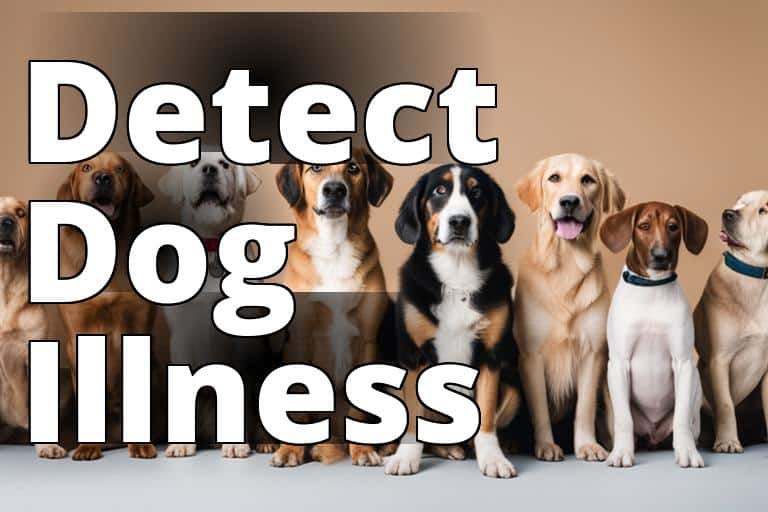

As responsible pet owners, it’s crucial to be attentive to our furry friends’ well-being. Monitoring our dogs’ health is an essential part of ensuring they lead happy, healthy lives. Regular veterinary check-ups play a pivotal role in maintaining their overall wellness.

Recognizing Signs of Illness in Dogs
By reading this article, you will learn:
– How to recognize physical signs of illness in dogs.
– How to identify behavioral and postural indicators of illness in dogs.
– The importance of proactive support for dog’s health and well-being.
Physical Signs of Illness in Dogs
Our canine companions can’t verbally communicate when they’re feeling unwell, so it’s up to us to be vigilant about detecting signs of illness. Here are some physical indicators that your dog may be sick:

Changes in Eating Habits
One of the most noticeable signs of a sick dog is a sudden change in eating habits. A decrease or complete loss of appetite could indicate an underlying health issue. On the other hand, increased hunger or excessive thirst might also signal a problem.
Lethargy or Unusual Fatigue
If your usually active dog seems unusually tired or disinterested in activities they normally enjoy, it could be a sign of illness. Lethargy and fatigue are common symptoms that warrant attention.
Vomiting or Diarrhea
Digestive issues such as vomiting or diarrhea are clear indications that something may be amiss. It’s essential to monitor these symptoms and seek veterinary advice if they persist.
Changes in Water Consumption
An increase or decrease in water intake without a clear reason could be a sign of an underlying health issue. Monitoring your dog’s water consumption is crucial for detecting potential problems.

Respiratory Issues
Coughing, wheezing, or labored breathing should never be ignored. These symptoms may point to respiratory problems or other serious conditions.
Changes in Urination
Frequent, urgent, or painful urination could be signs of urinary tract issues or other health concerns. Conversely, a decrease in urination might also indicate a problem.
Skin and Coat Changes
Inspect your dog’s skin and coat regularly. Noticeable changes like dry, flaky skin, hair loss, or the development of rashes should prompt a visit to the veterinarian.

Behavioral Changes
Pay attention to any unusual or uncharacteristic behaviors your dog exhibits. Aggression, anxiety, or withdrawn behavior can be indicative of an underlying health issue.
Fever
Fever is a common sign of infection or inflammation. Using a rectal thermometer to monitor your dog’s temperature can provide important information about their health status.
Pain or Discomfort
Dogs may exhibit signs of pain or discomfort by whimpering, restlessness, or guarding a specific body part. These signs should never be overlooked.
Unexplained Weight Loss
A sudden or unexplained drop in weight could be a cause for concern and may indicate an underlying health issue.
Changes in Grooming Habits
Dogs are generally fastidious groomers. A lack of grooming or excessive licking in a specific area may signal discomfort or illness.
Eye or Ear Issues
Redness, discharge, or excessive scratching of the eyes or ears may indicate infections or other issues that require attention.
Unusual Odors
Foul or unusual odors emanating from your dog could be a sign of dental issues, skin infections, or other health problems.
Age-Related Changes
As dogs age, they may experience a range of health issues. It’s important to be mindful of changes in behavior and physical condition as they grow older.
Changes in Appetite
An increased or decreased appetite can be an important indicator of a dog’s health status.
Persistent Coughing
Persistent coughing may point to respiratory infections, heart issues, or other medical conditions that require evaluation.
Seizures or Tremors
Uncontrolled shaking, tremors, or seizures are serious signs of neurological or other health problems and require immediate attention.
Sudden Changes in Mobility
A sudden onset of lameness, limping, or difficulty moving could indicate pain, injury, or other health issues that need to be addressed.
Nasal Discharge
Unusual nasal discharge, especially if it’s discolored or accompanied by other symptoms, can signify an underlying health problem.
| Physical Signs of Illness in Dogs | Behavioral and Postural Indicators of Illness |
|---|---|
| Changes in Eating Habits | How do dogs behave when they are sick? |
| Lethargy or Unusual Fatigue | Changes in posture and movement patterns |
| Vomiting or Diarrhea | Recognizing signs of distress or discomfort |
| Changes in Water Consumption | |
| Respiratory Issues | |
| Changes in Urination | |
| Skin and Coat Changes | |
| Behavioral Changes | |
| Fever | |
| Pain or Discomfort | |
| Unexplained Weight Loss | |
| Changes in Grooming Habits | |
| Eye or Ear Issues | |
| Unusual Odors | |
| Age-Related Changes | |
| Changes in Appetite | |
| Persistent Coughing | |
| Seizures or Tremors | |
| Sudden Changes in Mobility | |
| Nasal Discharge |
Behavioral and Postural Indicators of Illness
In addition to physical symptoms, changes in behavior and posture can also provide valuable insights into your dog’s health.
How do dogs behave when they are sick?
Dogs may display signs of illness by becoming more withdrawn, seeking solitude, or displaying uncharacteristic aggression or irritability. On the other hand, some dogs may seek more attention or comfort when feeling unwell.
Changes in posture and movement patterns
Observe your dog’s posture and gait for any changes. Dogs in pain may adopt a hunched posture or may be reluctant to move or jump.
Recognizing signs of distress or discomfort
Whimpering, excessive panting, or an inability to get comfortable may indicate that your dog is experiencing distress or discomfort.
Detecting Signs of Illness
How can you tell if your dog is not feeling well?
It’s essential to be attuned to your dog’s normal behavior and routines. Any deviations from their usual patterns could be indicative of illness.
When should I be concerned about my dog being sick?
If you notice any of the aforementioned signs or a combination of unusual behaviors, it’s important to seek veterinary advice promptly.
What are 3 signs your dog is suffering?
Three significant signs that your dog may be suffering include persistent vomiting or diarrhea, unexplained weight loss, and noticeable changes in energy levels or behavior.

Preventive Care and Seeking Professional Help
Regular veterinary check-ups are vital for maintaining your dog’s health. Early detection of health issues can significantly improve treatment outcomes.
Importance of regular veterinary check-ups
Routine veterinary visits facilitate early detection of potential health problems and allow for timely interventions.
Recognizing signs and seeking professional medical care
Being informed about the signs of illness enables pet owners to seek professional medical care promptly, which is crucial for their dog’s well-being.
Risks of ignoring signs of illness in pets
Ignoring signs of illness can lead to the progression of health issues, potentially resulting in more complex and costly treatments down the line.
Tips for preventive care
Maintaining a healthy diet, regular exercise, and adhering to vaccination and parasite control schedules are integral to preventive care for dogs.
Conclusion
Recognizing the signs of illness in dogs empowers pet owners to take proactive measures to safeguard their beloved companions’ health and well-being.
Additional Resources
Bibliography
- “Signs Your Dog May Be Sick”: American Kennel Club
- “Recognizing the Signs of Illness in Dogs”: American Society for the Prevention of Cruelty to Animals
Legal Disclaimer
The information provided in this article is for informational purposes only and is not a substitute for professional veterinary advice. It’s essential to consult a qualified veterinarian for specific concerns regarding your dog’s health.
Questions
Who can recognize signs that your dog is sick?
A pet owner who is attentive to changes in behavior and appearance.
What are common signs that your dog is sick?
Lethargy, loss of appetite, vomiting, and diarrhea are common signs.
How can I check if my dog is sick?
Regularly monitor your dog’s behavior, appetite, and physical condition.
What if my dog is just acting differently but seems fine?
Any change in behavior warrants a check-up with a veterinarian.
How can I help prevent my dog from getting sick?
Ensure your dog receives regular veterinary check-ups and vaccinations.
What if I can’t afford vet care for my sick dog?
Look into low-cost veterinary clinics or financial assistance programs.




